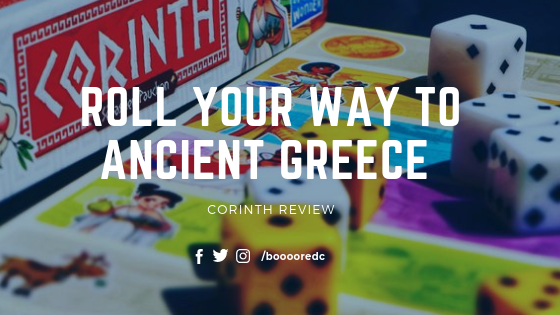Corinth is a roll-and-write game and one of the latest games published by Ticket To Ride publisher Days of Wonder.
/pic4521267.png)
What’s are Roll-and-write games we can hear you asking are pretty much what they sound like: You roll a set of dice and then mark something off on your personal scoresheet based on some choice of the dice you rolled. Yahtzee is probably the best-known roll-and-write games, while games like railroad ink have started a resurgence of the gaming mechanic.
Corinth’s twist, is the way the dice—a minimum of nine each roll—are parsed once rolled. There’s a small board, the only game part beyond the dice and the scorepad, with six spaces on it. You separate all the dice you rolled by their value, place all dice of the highest value in the top row, and then place the remainder by filling up from the bottom—which means the second-highest slot is empty unless you rolled all six values. You can also add up to three yellow dice on your turn to roll that are only available to you.
/pic4521269.jpg)
Once the dice are rolled and placed, the active player/ the person rolling the dice gets to choose all the dice in one row and either use their row function or their face value. The players go around the table and select from the remaining rows; in a two-player game, the roller gets to select a second row. The actions you take correspond to three of the areas on your personal scoresheet.
The left side of your sheet has four merchants to whom you can deliver goods for points—if you fill up any one space, with two to five goods, you score a fixed number of points at game end—and the middle four rows of the board correspond to those merchants. If you take three dice from the blue row, you can cross off any three goods depicted in the blue shops on your scoresheet. (Any extra dice you can’t use are ignored.) If you’re the first person to fill in all the goods spaces in all of the shops for the green, blue, or purple rows, you get a second bonus.
The top row of the board gives you gold, and the bottom gives you goats, also one per die. You can use these to build four buildings (which doesn’t require an action) that give you points or in-game powers, and you can also pay one gold to roll an additional yellow die on your turn that only you can take. Once you’ve selected a row, all yellow dice still on the board are removed. At game end, you get one point per two gold and one point per two goats remaining, so even if you don’t need them for buildings, sometimes you should use whatever floats your goats ‘til the end.
/pic4521268.png)
The merchant track—which looks a bit like a maze—on the upper right of your scoresheet. You can choose a row of dice and use the face value of those dice, rather than their quantity, to move the merchant around his little labyrinth that number of spaces and gain some bonus for the space where he lands. This can be one or two goods, a gold coin, some goats, or a yellow die you can add on every roll for the remainder of the game. There are three corner spaces where you can send your merchant to get points for every space where you’ve already stopped, and when you go to the second scoring space, you score for the first space a second time, with the same applying to the third scoring space. It’s the least intuitive part of Corinth, but you can’t ignore it—at the very least, you’ll probably want to get one extra yellow die, and some of the other bonuses can be critical to filling rows.
The game ends after every player has had 18 turns in a two- or three-player game or 16 turns in a four-player game—so you get to roll nine, six, or four times if there are two, three, or four players. You add your points from the shops, the merchant maze, any gold or goats left over, and if you built the first building you get three points per completed building (up to 12 total). That’s the entire game. Once folks know the rules and the modest strategy involved, turns are quick. You could probably just punt the merchant scoring parts if you wanted to bring younger players into the game as well.
Overall thoughts on the game as a straight roll-and-write, Corinth checks all of the boxes you expect from it—it’s fun, quick-moving, not too hard to learn, but gives you enough options on each turn that you still have to plan ahead and come up with a strategy, even a simple one.

